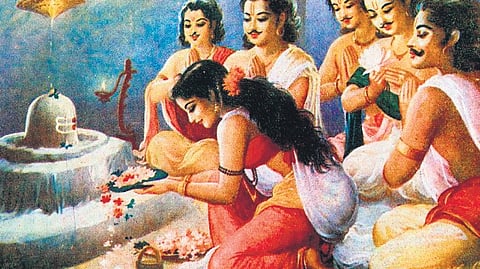Epics for children | The greatest wonder in the world
Towards the end of their 12-year-long exile, the Pandavas were residing in Dwaitavana. While the brothers were sitting together, a Brahmana approached them and requested them to retrieve his churning rod, which had been used to light a fire through friction and had got stuck to a deer’s antlers. The five Pandavas swiftly rushed after the deer.
Despite a long pursuit, the deer evaded them and disappeared into the forest. The Pandavas were exhausted, hungry and thirsty. Yudhishthira asked Nakula to fetch water for everyone. He found a lake and was about to drink the water when an invisible voice said, “This lake is mine. First answer my question, and only then can you drink the water.”
Nakula was thirsty. Ignoring the voice, he drank the water and collapsed. Yudhishthira was concerned when Nakula did not return for a long time. One by one, he sent Sahadeva, Arjuna and Bhima to check on their brothers. They all tried to drink from the lake and collapsed like Nakula.
Finally, Yudhishthira went to find out what the matter was. He reached the lake and saw his brothers dead on its shore. He cried and sighed repeatedly. He did not suspect that the water could be poisoned because his dead brothers looked healthy. After some time, he too went into the lake to drink water. An invisible voice said, “I am a crane, and this is my lake. Answer my questions before drinking the water, or else you will be dead like your brothers.”
Yudhishthira replied, “You have felled these brave warriors, who were invincible. This cannot be the work of a bird. Who are you?”
At this, a Yaksha (nature spirit) revealed itself to Yudhishthira and started asking questions on Dharma. One of the questions he asked was: What is the greatest wonder in the world?
Yudhishthira replied, “The greatest wonder in the world is that despite seeing death and destruction all around, people continue to live their lives as if they are immortal.”
Deep down, all of us know that death is inevitable, but sometimes, our everyday actions don’t reflect this. We all have some goals and ambitions in life. There are things we want to do, things we want to become. But we tend to get so caught up in the minutiae of living that we forget to live.
We postpone our enjoyment and our goals to the future, thinking that the conditions in the future will be more conducive than they are at present. Often, the future is no different from the present, and the postponement continues indefinitely. We need to recognise that we could die at any moment and should be working on the important things now, not later.

